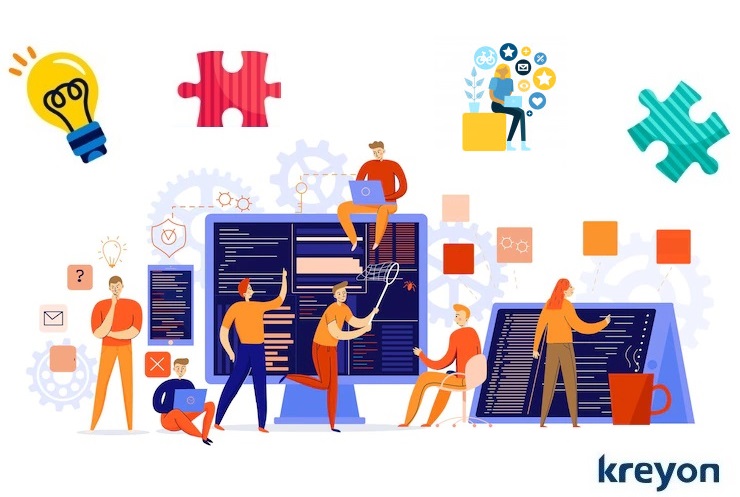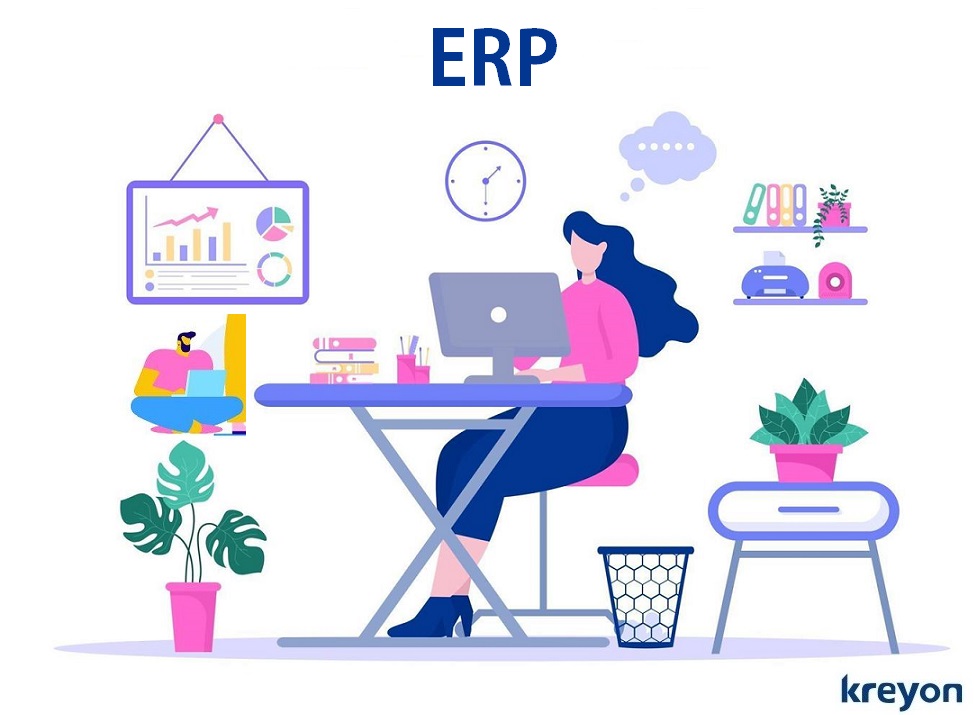5 Ways a Custom ERP Can Run Your Business

A custom ERP is uniquely tailored for your organisation to help your company run its business functions using technology and automation. As businesses reinvent themselves with new business models and technology-driven processes, a custom ERP has become the requisite need.
As per the Business Futures report 2021, the changes taking place in the business world globally have forced companies to rethink the what, where and why of their existing
operational models. Here’s a look at how a custom ERP can you build a digital organisation to keep up with modern business and workplace trends:
1. Customer Demand for Online Sales & Services:
The way your organisation generates leads, acquires customers, provides them support and service is often unique. The lifecycle management of customer journey can be tailored as per your organisational needs.
The customer experience, prioritisation, retention and referral process can be specifically developed for your organisation. Moreover, your secret sauce is built into the custom ERP to give your company a competitive edge. It could be location sensitive filters for lead generation, qualifying leads or companies based on specific criterion or delivering superior customer support, a customer EPR can be handy.
Companies are evaluating new business models to provide online sales and subscription support to their clients. They are experimenting with a complete online sales and support model where customer experience is the top priority. An ERP can be used to create a custom solution for managing customers from the first to the latest interaction with your company.
Automation of business functions, building integrated systems and increasing customer visibility leads to improved customer experience & hence increased cashflows for a business.
2. Digitally Enabled Workforce

Businesses after COVID rely on geographically dispersed teams for delivering their products and services. Working across locations, geographies and timezones has become a new normal for companies.
As companies work towards striking a balance between their offline and online teams, a custom ERP can help develop the right collaboration among teams. A custom ERP is sensitive to the needs of the organisations, improve data privacy, confidentiality and delivery of projects for clients. At the same time, it improves visibility of work and promotes productivity for its teams.
The customer ERP helps companies manage onboarding of new employees, provide them with basic project trainings and assist them with the know how on delivering their best. A custom ERP creates a uniform structure on deliverables, project deadlines and work needs for all employees. It can create a proactive communication platform where teams work together to remove hurdles, without distractions to deliver the right results.
A custom ERP can use automation to aid employee productivity. For e.g. a sales person can use a company template to send sales proposals to prospects, they can also use automation to get all the required approvals for price or time estimates etc.
3. Migration of Assets to Cloud
A customer ERP can help to consolidate the data footprint of an organisation. While the companies are moving online, not having the right data or organisational assets in digital form can be an impediment to business decisions.
A custom ERP brings about integrated data functions across business units. The company can decide their assets and data to improve their operational efficiencies. The data security, supply chain automation and moving to cloud has helped businesses to operate with unprecedented speeds.
ERP organises and integrates all the functional units of a business namely manufacturing, marketing, lead prospecting, HR, finance, accounting and management reporting etc. The company can take a call on the most important functions that need to be managed with ERP and prioritize moving them to the cloud.
A key consideration in moving data and other organisational assets to the cloud lies in migration of the legacy systems. For e.g. if an organisation uses an accounting software for regulatory reporting & decides to move to a custom ERP. The legacy accounting data can be migrated to the custom ERP. The custom ERP software provides tools to help with the data migration & support the processes for it.
4. Changing Customer Needs
 Adapting to the changing customer needs is a challenge for most companies. The customer needs change quite fast and they have been exaggerated by the pandemic too. The disruptions in the supply chain and limitations in workforce mobility make it even harder for companies to respond fast. This is where a custom ERP can save the day for companies.
Adapting to the changing customer needs is a challenge for most companies. The customer needs change quite fast and they have been exaggerated by the pandemic too. The disruptions in the supply chain and limitations in workforce mobility make it even harder for companies to respond fast. This is where a custom ERP can save the day for companies.
A custom ERP creates a digital organisation that is adaptive to the needs of its customers. The ERP can predict the customer behaviours using AI & ML algorithms, it can also help companies work proactively with their vendors to replenish their inventories to meet customer demands.
An ERP creates a data driven organisation where all key business decisions are backed by accurate data. A digital organisation uses technologies and automations to gain efficiencies. Businesses need to be able to adapt to changing market dynamics fast and a digital organisation is capable of dealing with the market disruptions quicker. The supply chain visibility and key operations can be tracked using the online ERP, machine learning models and algorithms are also useful in creating value chains.
5. Innovative Customisations
A custom ERP can help your organisation to build tailored business processes that streamline your operations. It can bring out the best in your organisation according to its strengths.
Many healthcare organisations launched online check-ups and doctor appointments. The diagnosis, prescription and follow-up with patients can now be done using chat based tools for a wide range of patients. A custom ERP can be developed by an organisation to unleash innovative streaks out of its employees and serve customers using these innovations.
A custom ERP can have modules and functionality to leverage organisation wide creativity. An integrated software makes employees more productive too. Learning too many different application softwares can be counter productive for employees, especially those who are new to your organisation. An integrated ERP can make workflow easier and increase productivity leading to more time for employees to innovate.
An ERP can channelise the creativity and instutionalize innovation to meet the hard pressing needs of the business. Building virtual supply chains, developing omnichannel models for reaching more customer, personalised customer experiences etc. are some of ways innovative customisations are benefitting the companies.
A custom ERP implementation requires in-depth analysis of business processes. Kreyon Systems is an ERP Software Company with custom ERP development expertise for governments & corporates. If you have any queries, please reach out to us.
